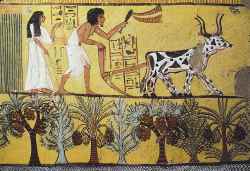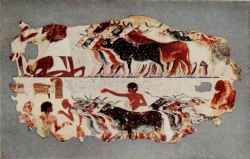NōꞋakh 2nd Eve
(Continuation of Pâ•râsh•atꞋ bᵊ-Reish•itꞋ)

Cowboy HëvꞋël & Farmer QaꞋyin
 |
According to the genealogy of the Biblical family as recounted from memory by the earliest extant writers, •dâmꞋ and Khaw•âhꞋ had two children: QaꞋyin, who became a farmer, and his brother, HëvꞋël, who became a rancher.
 |
Only the first and choicest things are worthy to be presented to ä', never second or ordinary (profane) things. But, at the end of one season, QaꞋyin offered some left-over grain as a Mi•nᵊkh•âhꞋ to ä', while his brother, HëvꞋël, grilled the khëlꞋëv of the choicest firstling of his tzon as an ascendance.
Over the next season, ä' saved HëvꞋël, as his tzon thrived and increased; but He didn't save QaꞋyin, whose crops failed.
So QaꞋyin fumed.
The original principle of salvation never changes: if you make tᵊshuv•âhꞋ, your misstep will be borne up (in an ascendance); but if you don't make tᵊshuv•âhꞋ, then your misstep remains crouched by your door to pounce on you.
But QaꞋyin didn't make tᵊshuv•âhꞋ. Instead, he nurtured the anger that burned inside him like a cancer – until, finally, he murdered his own brother, HëvꞋël.

Optional parental preparation:
- Readers unfamiliar with Tor•âhꞋ should study the glossary entry (link) for tᵊshuv•âhꞋ.
- You might want to discuss how ranchers (cowboys) and farmers conflict over land and grazing rights; and what caused range wars in the American Old West that may have been part of the conflict in ancient times as well. How does an Alaskan homesteader family harmoniously merge the two? (E.g., TV documentary, Alaska: the Last Frontier)
Questions you might anticipate that your child might raise and be prepared to discuss:
- What is murder? (I.e., how does murder differ from killing by accident or soldiers in war?)
- What does "borne up" mean? (past perf. of "bear up," bear aloft; Hebrew verb ðÈùÒÈà). It would likely be fascinating to discuss how, in ancient times, people imagined they could impute their wrongs to an animal they owned, which could then (be burned up entirely), having disappeared with the animal parts from the altar-grill and "going up in smoke" (ascending) as a sacrifice offering (which "the ël•oh•imꞋ" would consume, and they would eliminate the wrongs that had been imputed into the animal).
Google+ registered author & publisher

